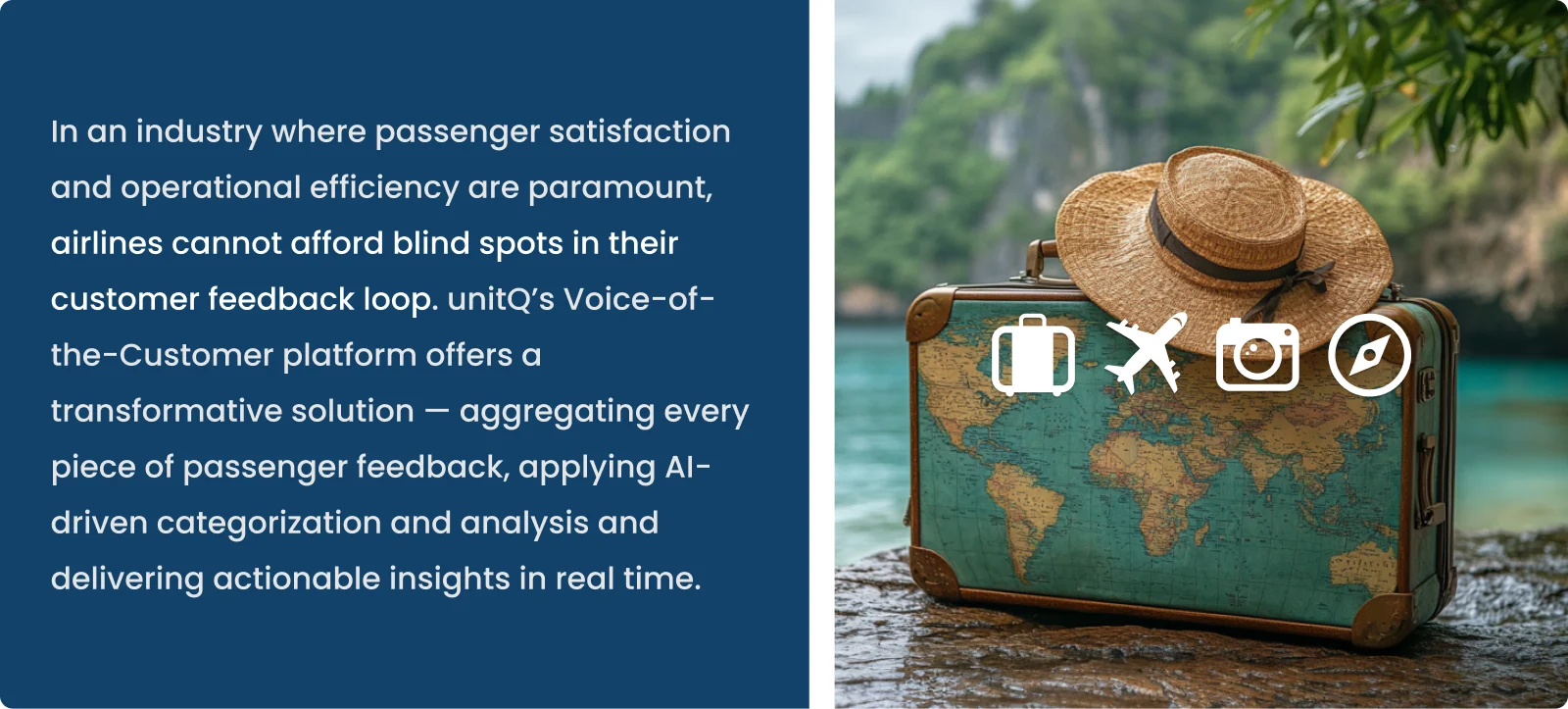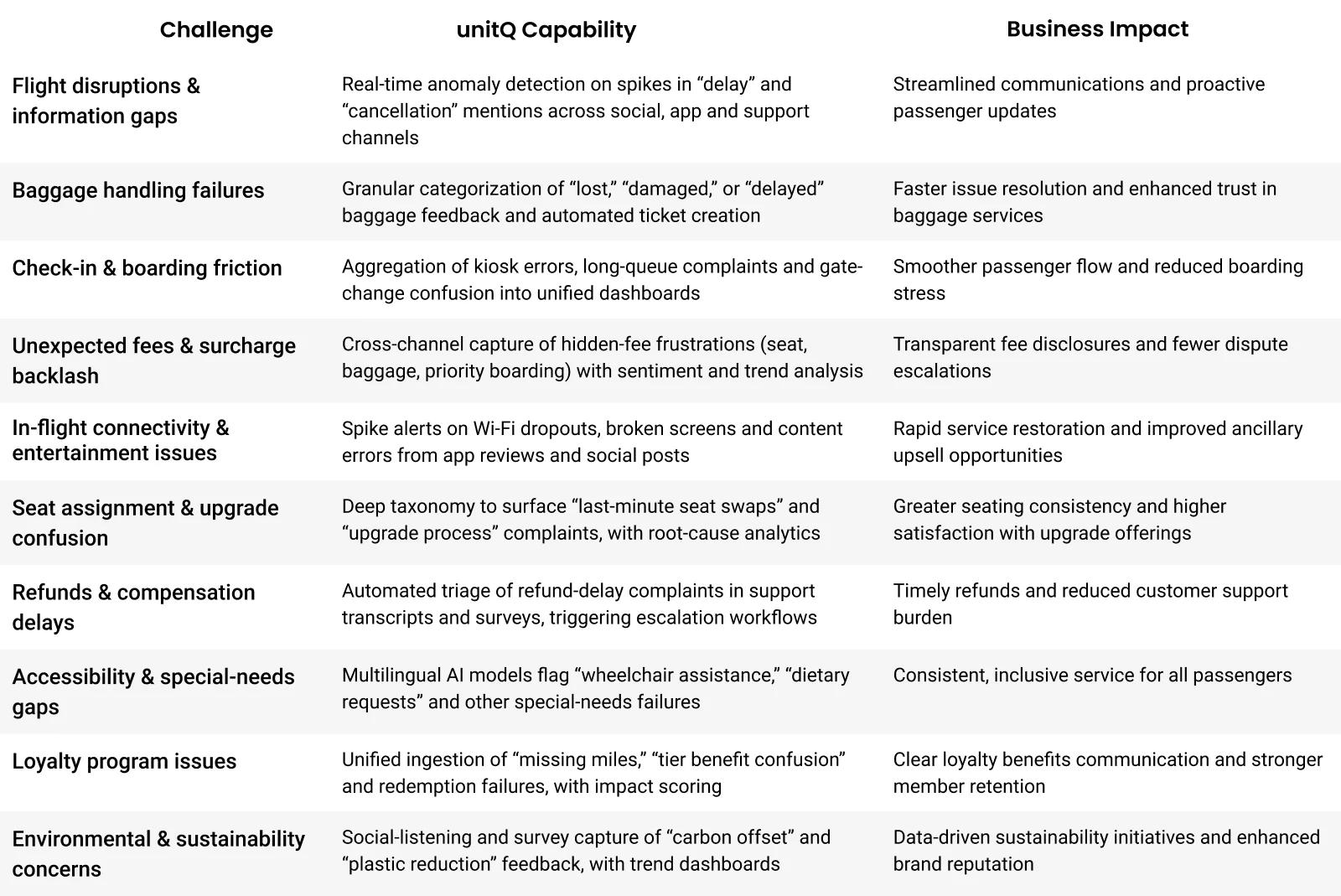Turbulence to triumph: transforming airline operations with real-time customer feedback

Airlines are scrambling to win travelers with rewards programs and rock-bottom fares. At the same time, passengers are judging the brand moment by moment, from mobile check-in to claiming their baggage. While point-in-time interactions (e.g., handling a delay or resolving a seat issue) shape immediate satisfaction, lasting loyalty depends on how effectively airlines translate those moments into continuous operational improvements.
In this environment, understanding and acting on passenger feedback is essential for maintaining operational excellence, brand loyalty and revenue growth. To make that happen, airlines must capture customer insights from every interaction — social media, mobile apps, surveys, direct messages, call centers and more — and respond in real time.
However, legacy customer feedback processes are often siloed, manual and slow, leaving airlines blind to emerging issues that erode brand and customer trust.
unitQ’s AI-powered customer insights platform aggregates feedback from all channels, applies a proprietary multi-layer taxonomy and generative AI for instant categorization and delivers real-time alerts and root-cause analyses. This analysis explores common passenger pain points, feedback channels, the limitations of traditional approaches and how unitQ enables airlines to transform raw passenger feedback into actionable insights to close the feedback loop faster and elevate the customer experience.

Flights face turbulence — your customer experience should not
Air travelers routinely face a host of challenges that can trigger feedback across channels:
Flight disruptions: Delays and cancellations lead to social media outbursts and surge in support tickets when information is lacking or inconsistent.
Loyalty program issues: Delayed or missing miles credit, confusing tier benefits and redemption failures prompting complaints via social media, in-app feedback and post-flight surveys.
Baggage handling: Lost, delayed or damaged luggage spawns complaints via airline apps, email and DMs, often necessitating manual follow-up.
In-flight services: Issues with seating comfort, entertainment systems, Wi-Fi connectivity, meal service quality and cabin cleanliness drive passenger dissatisfaction.
Booking and app usability: Errors in booking flows, mobile app crashes, confusing fee disclosures and loyalty program glitches provoke negative reviews and surveys.
Customer support interactions: Inefficient interactive voice response systems, long hold times and untrained agents contribute to frustration, expressed in call-center transcripts and chatbots.
Check-in & boarding friction: Malfunctioning kiosks, long queues and confusing gate changes that drive complaints via app feedback and social channels.
Unexpected fees & surcharges: Hidden charges for seat selection, baggage or priority boarding leading to poor reviews and DM escalations.
Refunds & compensation delays: Slow or opaque refund workflows for canceled flights, resulting in email grievances and negative NPS survey comments.
Accessibility & special-needs gaps: Inconsistent fulfillment of wheelchair, dietary or assistance requests triggering feedback in DMs and post-flight questionnaires.
Environmental & sustainability concerns: Passenger calls for greener operations — carbon-offset options or plastic reduction — shared on social platforms and surveys.
It’s true, weather, airport delays and supply chain hiccups essentially are out of the airlines’ control. Regardless, few customers erupt louder than those stranded by a canceled or delayed flight. They voice these and other concerns about their airline carriers everywhere they engage: live tweets and direct messages on social platforms, in-app feedback forms, email surveys and support interactionsthat create a vast, fragmented feedback landscape.
Limitations of traditional feedback approaches
Most airlines rely on support interactions, periodic surveys and separate, secondary feedback analytics tools for social, app and support data. This “survey-first” model suffers from:
Sampling bias: Surveys capture feedback from a small percentage of passengers, missing real-time signals of frustrated customers.
Siloed channels: Social mentions stay in marketing dashboards, call-center logs live in support systems and mobile app feedback sits in product tooling — hindering a unified view.
Delayed insights: Manual tagging and batch processing introduce lag, allowing small issues or “micro outages” to escalate into costly disruptions.
Low granularity: Sentiment scores alone don’t reveal whether complaints stem from seat comfort, boarding procedures or baggage fees, preventing precise root-cause analysis and, in turn, fails to provide the necessary team action on how to change the experience.
As a result, airlines struggle to act proactively, often chasing yesterday’s problems rather than preventing tomorrow’s service failures.
unitQ: A unified, AI-powered customer insights platform
unitQ replaces fragmented workflows with an end-to-end feedback lifecycle automation framework:
Aggregate feedback from all passenger touchpoints — social media mentions and DMs, mobile app reviews, in-flight surveys, email surveys, chat transcripts, in-person and more — into a single source of truth in real time.
Categorize each piece of feedback using a custom, multi-tier taxonomy (thousands of granular categories), powered by AI agents and human-in-the-loop quality checks to ensure accuracy across 100+ languages.
Analyze in real time with:
agentQ, a natural-language AI analyst that answers complex queries (e.g., “Which aircraft type is generating the most seat recline complaints?”).
Anomaly detection to alert teams when feedback spikes—such as sudden surges in Wi-Fi connectivity complaints on a specific route.
Custom dashboards that surface trends by region, airport, aircraft model, service class or loyalty tier, enabling data-driven decision-making.
Act by automatically creating tickets in support or engineering workflows (Jira, Zendesk), sending alerts to Slack, Microsoft Teams or PagerDuty and driving prioritized roadmaps based on impact analysis that links feedback to KPIs like NPS and revenue.
How unitQ addresses airline-specific challenges

The following case scenarios illustrate how unitQ’s unified, real-time customer-feedback intelligence platform empowers airlines to detect issues swiftly, pinpoint root causes with precision and drive high-impact actions that enhance passenger satisfaction and business performance:
Scenario 1: Maximizing revenue, retention on new premium offering
An airline launches a premium “Business Plus” service on its transatlantic route, bundling onboard lounge access, upgraded meals and priority boarding. The “Business Plus” service underperformed ticket sales expectations because of unclear lounge access policies and ambiguous pricing tiers, along with mobile boarding-pass errors.
With unitQ, the airline team is able to:
Detect a significant uptick in “Business Plus” complaints across social media posts, in-app feedback and email surveys — covering unclear lounge access, ambiguous pricing tiers, inconsistent meal and amenity fulfillment and mobile boarding-pass scanning errors.
Categorize each piece of feedback into precise sub-issues — “pricing-tier definitions unclear,” “lounge-hour discrepancies,” “in-flight amenity mismatches” and “boarding-pass barcode failures” — using unitQ’s multi-layer taxonomy.
Analyze root causes with agentQ, uncovering that pricing wasn’t synced across channels, the lounge policy in the mobile app was outdated, catering manifests didn’t align with published amenity lists and barcode formats failed on certain scanners.
Automate ticket creation in the product, operations and revenue-management teams’ Jira projects and send prioritized alerts to executive Slack channels with impact metrics tied to potential revenue at risk.
Act by updating the website’s pricing displays, synchronizing lounge-access rules across all platforms, standardizing amenity descriptions in the in-flight service guide and deploying a patch to fix barcode formatting for boarding passes.
Learn how Southwest Airlines offers “Great Customer Service.”
Scenario 2: Improving baggage handling
An airline experiences a sudden 200% spike in baggage-related complaints on X (formerly Twitter) and its mobile app for flights arriving at JFK.
With unitQ, the airline is able to:
Detect the anomaly within minutes via real-time alerts.
Categorize complaints into sub-issues (e.g., “tag-printing errors,” “carousel misrouting”).
Analyze root causes, revealing misconfiguration in the new carousel software after a recent update.
Automate ticket creation for the ground-ops engineering team and notifies the operations center via Slack.
Resolve the issue before major flight delays occur, reducing potential compensation claims and safeguarding brand reputation.
Scenario 3: Streamlining loyalty & promotion issue resolution
An international carrier launches a major promotion offering bonus miles for certain fare classes, but passengers begin reporting via social DMs, app reviews and email surveys that their accounts aren’t reflecting the bonus correctly.
With unitQ, the airline team is able to:
Detect a spike in “missing miles” complaints across Twitter DMs, App Store reviews and in-app feedback within 30 minutes.
Categorize feedback into sub-issues — “bonus not credited,” “erroneous deduction” and “account-level sync error” — using unitQ’s proprietary taxonomy.
Analyze root cause with agentQ, revealing that the bonus-crediting API failed for mid-tier members due to a configuration error in a recent code deployment.
Automate ticket creation in the loyalty engine team’s Jira project and trigger a Slack alert for the DevOps on-call, complete with customer impact metrics linked to projected revenue at risk.
Resolve the config error quickly, automatically reprocess the affected accounts and send proactive communications to impacted members — boosting customer trust and reducing potential support load by 70%.
In an industry where passenger satisfaction and operational efficiency are paramount, airlines cannot afford blind spots in their customer feedback loop. unitQ’s Voice-of-the-Customer platform offers a transformative solution — aggregating every piece of passenger feedback, applying AI-driven categorization and analysis and delivering actionable insights in real time.
About unitQ
unitQ, the leading customer insights platform, enables businesses to pinpoint real customer issues and needs instantly with AI. AI agents automatically transform customer feedback from diverse channels — such as support tickets, product analytics, app stores, social media, surveys and more — into actionable insights in real time.
Companies can drive product innovation, streamline issue resolution and elevate customer experiences, all guided by the authentic voice of their customers. AI agents aggregate and categorize all customer feedback into thousands of granular categories, ensuring organizations always understand precisely what matters most to their users.
Robust dashboards and alerts monitor customer experience trends and competitor offerings in real time. Accelerate product development cycles by closely tracking customer reactions to launches, identifying top feature requests and prioritizing roadmaps based on key performance indicators such as retention, Net Promoter Score (NPS) and Customer Satisfaction (CSAT).
Category-leading companies, including Bumble, Paypal and Zendesk trust unitQ to drive growth, reduce churn and build lasting brand loyalty.
Schedule a unitQ demo today!
David Kravets is Senior Content Marketing Manager at unitQ.


